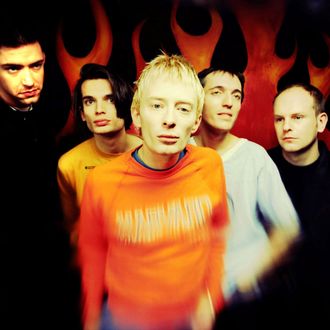
In terms of future paths, every band has several bands within it at the beginning. Radiohead was lucky; they got to walk down most of them. Over a career spanning decades, the British quintet has been, at different times, an electronica outfit specializing in cold, alienating brilliance; a delicate art rock collective high on thin, bright, watery lines of melody; a surging wall of guitars, determined to make no points that couldn’t be made forcefully; and an electronica outfit specializing in warm, fuzzy recessions; maybe much else that we’ve somehow neglected to notice. The band seems to have as many looks as the moon has phases, a trait cherished by critics who get easily bored and a tad annoying to fans, who can’t help but wish the band would stick with the sound of their favorite album. Though currently Thom Yorke & Co. seem busy curating their past output and suing Lana Del Rey, a long history of abrupt progressions means that there’s no way to safely assume they’ve run out of new sounds to present.
In this context, the band’s first album has always been difficult to grasp. While the band’s subsequent collections would each present a distinct, unique aesthetic (or, in the case of 2003’s Hail to the Thief, a mishmash of preexisting distinct, unique aesthetics), Pablo Honey, released 25 years ago today, stands apart in its formlessness. It’s not a moon in the night sky so much as the cloud in front of it. Powered by “Creep,” a seething, sullenly explosive lead single which remains the band’s highest-charting song in the United States, Pablo Honey sold well and guaranteed the fledgling band a career. But it’s also the source of a small degree of embarrassment from a band whose ambitions and self-presentation soon progressed beyond its humble beginnings. “Heaven forbid anyone should judge us on Pablo Honey,” guitarist Ed O’Brien said in 1997 as OK Computer blazed a pale trail across the firmament. For a long time, it was the only album whose songs would never be included on tour set lists.
Critics and the band alike seem baffled by an album so atypical, so shapeless — and above all, so sincere. Virtually nothing about Pablo Honey predicts the band that would emerge in The Bends and its successors. For all their sonic differences, what unites them is a pronounced sense of irony, and irony is precisely what Pablo Honey lacks: It’s a collection of songs where, even if some of the emotions are double-edged, their tone of delivery is straightforward. The questions of mass communication and social disaffection that Radiohead would mine later on is almost entirely absent as well.
And if the world does turn
And if London burns
I’ll be standing on the beach with my guitar
I want to be in a band when I get to heaven
Anyone can play guitar
And they won’t be a nothing anymore.
Even a band that comes to be renowned for detachment, it turns out, is subject to the same candor and haziness that tends to typify first albums. Since it hasn’t truly sunk in that the band is a public figure, the group operates entirely within its own matrix of influences; for the first and only time, there are no fans expecting anything from them, because there is nothing on which to base expectations. Perhaps not surprisingly — and this is what ties the album to the band’s future production — Pablo Honey falls between existing genres. “Creep” owes its sour dynamism and soft-loud contrast to the Pixies, and the melodic heft of Dinosaur Jr. is a clear inspiration throughout, but in general the coruscating edge of ’80s U.S. college rock has been softened by a coolness more British than American; even when they seethe, the songs on Pablo do not sweat. There are tendencies — abetted by the lack of irony — toward popular rock: a Billboard review at the time of release likened certain songs to U2. A BBC review in 2008 detected elements of prog rock. You could even argue that the album presages certain developments in American rock that had yet to take place in 1993: smoothing out the roughness of grunge and displaying a charm at once sweet, bland, and a little acid, Pablo Honey could be described as a British take on a Foo Fighters album two years before the first Foo Fighters album existed; and doesn’t Jonny Greenwood’s definitive guitar chunk on “Creep” sound, in retrospect, like the first sign of the rise of nü-metal?
Time and again, the emphasis falls on the indefinite and uncertain: The point is that anyone can play guitar, not on who is actually playing or what the guitar actually sounds like. “Dear sir, I have a complaint,” Yorke sings on “Stop Whispering.” But, he adds, “I can’t remember what it is.” The meekness would take on a sarcastic edge in later albums, and the complaints would become more grandly articulate, but something was lost in the evolution too; for all its fumbling, Pablo Honey retains an appeal that’s muffled by the reserve and distance of later Radiohead collections. If those albums show off all the different bands that Radiohead could be, their first displays glimpses of the bands they could have become but didn’t.
In this sense, the album’s final track, “Blow Out,” is its most intriguing. With its spare, piercing lyrics focused on touch and texture shot through with measured guitar freak-outs, it dramatizes the tension between the band’s drive toward formality and a more basic desire for immediate connection. “Everything I touch,” Yorke mournfully repeats, “turns stone.” Supple and intense, the song presents a band, mature beyond its years, capable of making its most abstract tendencies palpable and moving. It’s a reminder that there still remain possibilities for new pulses and progressions in rock — even if Radiohead, perhaps grasping itself too firmly, seems to be turning into a monument of the genre.

